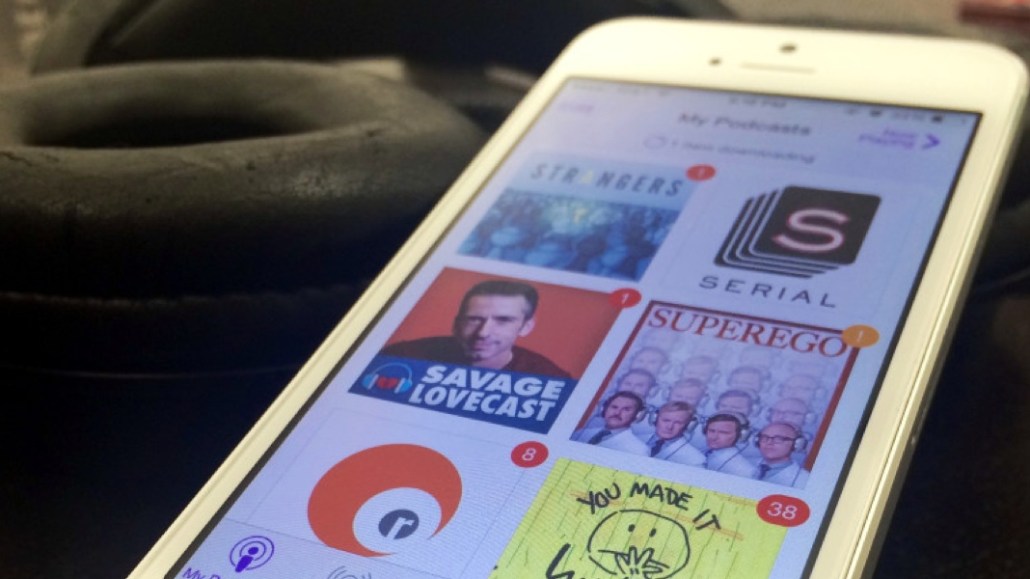Secure your place at the Digiday Media Buying Summit in Nashville, March 2-4
Studio71 has formed a podcast division producing shows with YouTube stars

Digital video network Studio71 is getting into the podcasting business to diversify its revenue and extend its deals with advertisers beyond videos on YouTube.
Studio71 is best known for operating a network of digital video creators, like YouTube star Lilly Singh, and producing original video shows starring that talent. Now, it’s formed a new division, Studio71 Podcasts, to also create podcasts with its creators. Overseen by Adam Boorstin, Studio71’s evp of global digital distribution, that five-person team has produced 11 podcasts since March that star Studio71 creators such as comedians Christine Sydelko and Harley Morenstein. By the end of this year, Studio71 expects to have nearly doubled its number of podcasts, with 80 to 100 episodes airing per month across its slate, said CEO Reza Izad.
Ten of the podcasts are part of a deal that Studio71 has with podcasting platform Castbox. Studio71 and Castbox distribute the podcasts on and off Castbox’s app and jointly sell advertisers on host-read ads that air during the shows, with both sides splitting the revenue.
Studio71 decided to get into podcasting last year after seeing some of its creators like YouTube stars Rhett & Link create their own podcasts without Studio71’s involvement and fielding questions from its advertisers about podcasting opportunities Studio71 could provide, said Izad. Because its creators could move their audiences from one platform to another, Studio71 wouldn’t need to spend much in marketing the podcasts to amass an audience it could sell to advertisers.
The podcasting business model is also familiar to Studio71, which sells ads against creators’ videos and advertiser-sponsored videos on YouTube, not unlike podcasting’s host-read promotional messages. That enables the audio format to be “very much an extension of what we do on our branded content business,” said Izad.
Studio71’s entry into podcasting coincides with creators’ continuing frustrations with YouTube, especially the platform’s response to its brand-safety issues that boiled over last year. To address advertisers’ concerns, YouTube took a more conservative approach when deciding whether a video was eligible to carry ads, but that has resulted in creators losing revenue and led many to turn to other avenues to bolster their businesses, such as podcasting. For example, YouTube star Cody Ko started his “Insanely Chill” podcast for that reason last year, and he now says the podcast is “one of the best things I do.” Ko said the podcast’s average ad price is “way higher” than what he makes per ad on YouTube, and he can distribute the podcast in video form on YouTube to add supplemental revenue.
YouTube’s adpocalypse did not factor into the Studio71’s move into podcasting, but it accelerated it, said Izad. The move corresponds with a yearslong trend of digital video creators and networks diversifying their businesses.
YouTube remains an important part of Studio71’s distribution. In addition to releasing the podcasts on audio platforms like Castbox, Apple’s Podcasts app and Spotify, Studio71 also uploads video versions to YouTube, where it can promote them to creators’ core audiences and run pre-roll and mid-roll ads to supplement the revenue from host-read ads.
Peter Vincer, Castbox’s head of global strategic partnerships, said one of the shows that Studio71 has produced with Castbox, “Don’t Mess with Christine Sydelko,” averages 75,000 to 100,000 podcast listens per episode and an additional 250,000-plus views on YouTube, “which is uploaded in its entirety with the [host-read] ads.”
More in Media

Media Briefing: Turning scraped content into paid assets — Amazon and Microsoft build AI marketplaces
Amazon plans an AI content marketplace to join Microsoft’s efforts and pay publishers — but it relies on AI com stop scraping for free.

Overheard at the Digiday AI Marketing Strategies event
Marketers, brands, and tech companies chat in-person at Digiday’s AI Marketing Strategies event about internal friction, how best to use AI tools, and more.

Digiday+ Research: Dow Jones, Business Insider and other publishers on AI-driven search
This report explores how publishers are navigating search as AI reshapes how people access information and how publishers monetize content.








